The film “Christopher Columbus” by David MacDonald in 1949 is the old standard version of the story honoring the ingenious hero who discovered the western hemisphere. Hal Erickson, however, called it “Reverent to the point of tedium…” Afterward, the reputation of the explorer became increasingly questioned, criticized and even attacked. Now, films about Columbus are increasingly irreverent to the point of fury.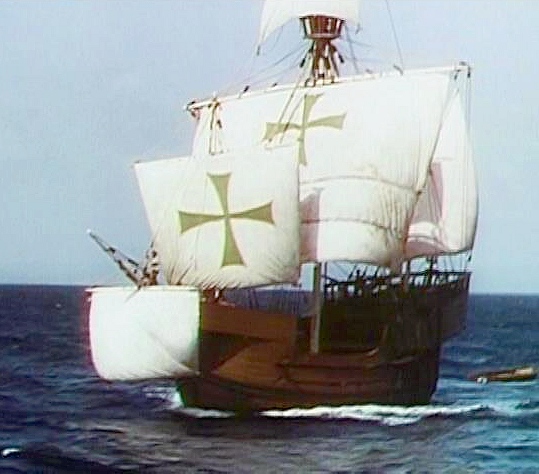
The six-hour epic miniseries in 1985 with Gabriel Byrne was still relatively fair, but highlighted the excesses of colonization. Erickson says that it adds a “Harlequin Romance” to the story. Then, for the 500th anniversary in 1992, there were two. Christopher Columbus: The Discovery with Georges Corraface dealt more with the process to get across the sea than the effect, yet the famed cast was poorly selected. Then, 1492: Conquest of Paradise with Gérard Depardieu was practically a horror movie.
We now live in a time of historical revisionism, which smears the glories of the Christian past while dignifying pagan cannibals as the victims of exploitation. Although mistreatment by conquistadors is undeniable, that hardly casts a shadow on the wonderful Christianization of the New World. The actual history is more religious than economic.
Providentially, the name “Christopher” means “Christ-bearer” and “Columbus” signifies “dove,” a symbol of the Holy Spirit. The flagship was the Santa Maria, the sails were emblazoned with the Cross and they deliberately brought Christianity to unbelievers. Bishops and priests were involved, and more or less included in casts, with more or less favorable scripts.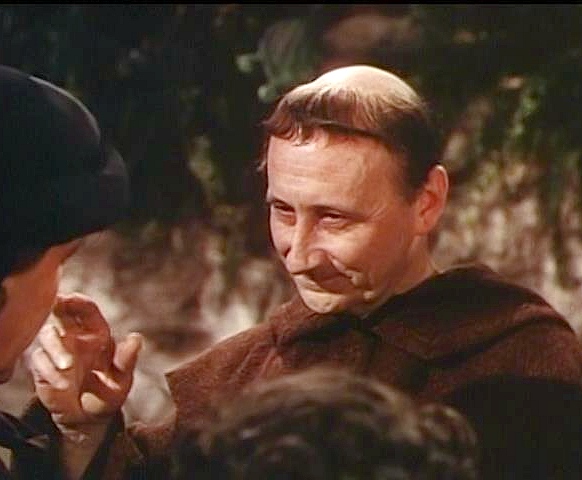
In this film, the splendid Felix Aylmer plays Father Perez. Columbus, played with flair by Fredric March, actually visited the Franciscan Friary of La Rábida in 1490. Although he tries to take advantage of the priest to gain access to the Queen, he is a man of faith. Columbus was actually a member of the Franciscan Third Order, a lay tertiary. Before they embark, Franciscans sing the Salve Regina (Hail Holy Queen).
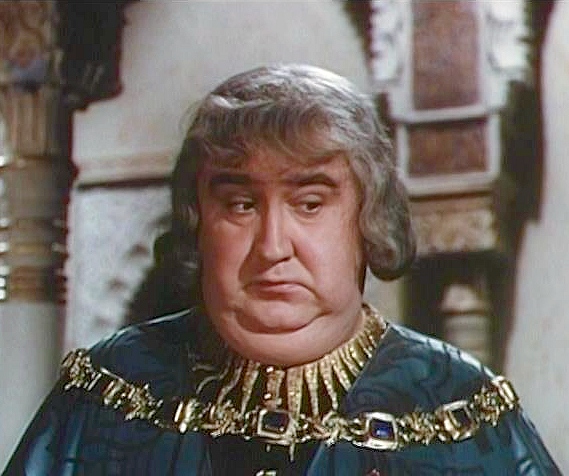 Francis L. Sullivan, who was Bishop Cauchon in Joan of Arc a year earlier, plays the antagonist, Francisco de Bobadilla. He wants Columbus to fail because it would ruin his investments in the Canary Islands. King Ferdinand is portrayed as terribly weak, but Isabella as strong. When Columbus gets his chance with the queen, he tells her of riches that could pay for their war against the Moors. She sets up a commission to investigate, which includes Dominican friars. For three years, the patience of Columbus is severely tried. Bobadilla also uses his cousin, Beatriz, as a snare for Columbus, but the widower will not remarry.
Francis L. Sullivan, who was Bishop Cauchon in Joan of Arc a year earlier, plays the antagonist, Francisco de Bobadilla. He wants Columbus to fail because it would ruin his investments in the Canary Islands. King Ferdinand is portrayed as terribly weak, but Isabella as strong. When Columbus gets his chance with the queen, he tells her of riches that could pay for their war against the Moors. She sets up a commission to investigate, which includes Dominican friars. For three years, the patience of Columbus is severely tried. Bobadilla also uses his cousin, Beatriz, as a snare for Columbus, but the widower will not remarry.
Finally, Father Perez prevails upon her majesty. Coincidentally, here at Saint Dominic’s Church in Washington, we have a stained-glass window depicting the Dominican professor, Diego de Deza, sponsoring the explorer before Queen Isabella, assuring her that the world is round. That was not a “crackpot” idea because Saints Albert and Thomas had taught that centuries earlier.
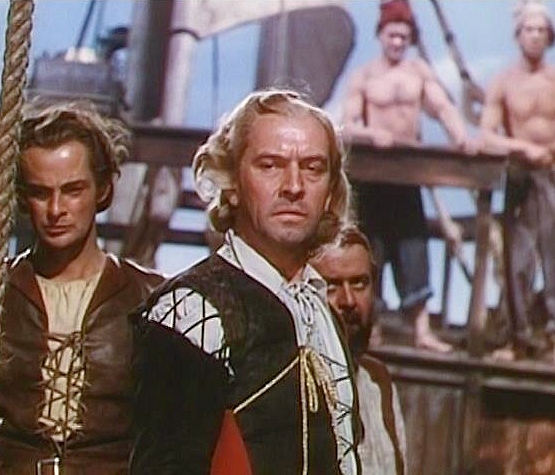 Columbus finally gets his fleet, but talk of a New World is anachronistic because he intended to reach India, not to discover other continents. Of course, the crew fears mythological sea serpents and the like. A more realistic fear is that the wind always blows west, so how do they sail home? They did not realize, as the admiral did, that it blows east in the northern sea. Columbus deserves credit for overcoming the doubts and resistance of others with great courage and perseverance. Even the threat of mutiny was surpassed, yet it adds an exciting action-scene. The unit of measurement used was the league, which was about the distance a man could walk in an hour or roughly three miles.
Columbus finally gets his fleet, but talk of a New World is anachronistic because he intended to reach India, not to discover other continents. Of course, the crew fears mythological sea serpents and the like. A more realistic fear is that the wind always blows west, so how do they sail home? They did not realize, as the admiral did, that it blows east in the northern sea. Columbus deserves credit for overcoming the doubts and resistance of others with great courage and perseverance. Even the threat of mutiny was surpassed, yet it adds an exciting action-scene. The unit of measurement used was the league, which was about the distance a man could walk in an hour or roughly three miles.
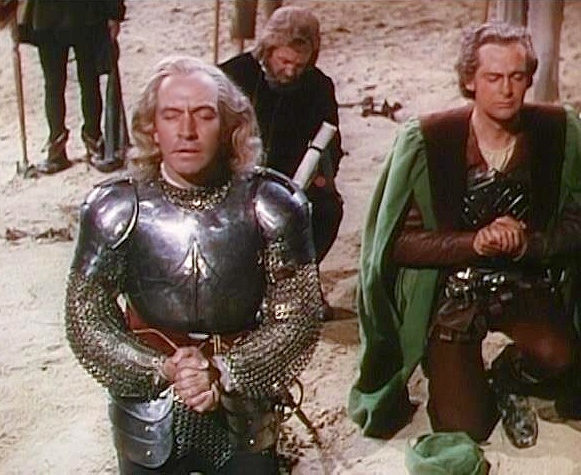 On October 10th, they sighted a large flock of birds, but no land. According to the script, Columbus himself discovers land when he sees a light at night. Columbus falling on his knees on the beach to offer a prayer of thanksgiving is beautiful, but is the declaration of a colony immoral? It is not necessarily. Christian civilization extending to the west has been compared to the conquest of Canaan by the Israelites, but the issue is too subtle for easy answers. In the film, Columbus explicitly tells a sailor trading with natives not to exploit them.
On October 10th, they sighted a large flock of birds, but no land. According to the script, Columbus himself discovers land when he sees a light at night. Columbus falling on his knees on the beach to offer a prayer of thanksgiving is beautiful, but is the declaration of a colony immoral? It is not necessarily. Christian civilization extending to the west has been compared to the conquest of Canaan by the Israelites, but the issue is too subtle for easy answers. In the film, Columbus explicitly tells a sailor trading with natives not to exploit them.
Martin Alonso Pinzon, the captain of the Pinta, however, disobeys the admiral and leaves. Meanwhile, Columbus continues to explore and discover places, like Cuba, and things, like hammocks and tobacco. On Christmas Day, the Santa Maria ran aground, so Columbus decides to leave 40 men ashore to establish a settlement with his friend, Diego, as governor. Columbus returns on the Niña. He is met with cheers and flowers by the people. He comes before the king and queen with pomp and fanfare. At the banquet, Columbus shames his rival, Bobadilla, by teaching that anything is easy when someone shows you how.
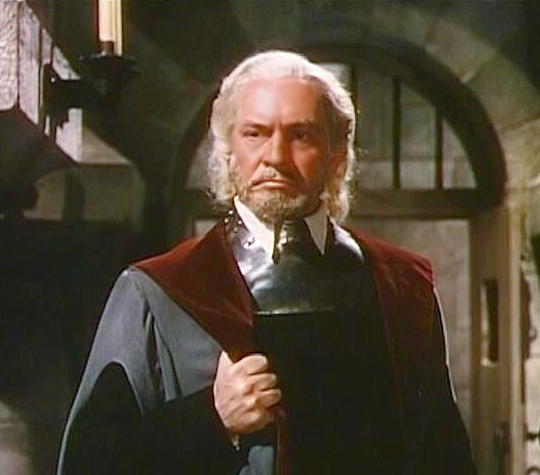 After the initial glory, we learn that evil has tainted the New World. There has been bloodshed. Isabella wants the natives converted, not enslaved. By 1499, the king decides that Columbus is not competent to govern, but the queen will not have him disgraced. Bobadilla, nevertheless, has him arrested, shackled and brought back to Spain. The contrast between his earlier entrance into court and this one is extreme, especially chained in a Franciscan habit. Their highnesses remove the shackles and restore his titles and monies, but retain him in Spain, which feels like worse bondage.
After the initial glory, we learn that evil has tainted the New World. There has been bloodshed. Isabella wants the natives converted, not enslaved. By 1499, the king decides that Columbus is not competent to govern, but the queen will not have him disgraced. Bobadilla, nevertheless, has him arrested, shackled and brought back to Spain. The contrast between his earlier entrance into court and this one is extreme, especially chained in a Franciscan habit. Their highnesses remove the shackles and restore his titles and monies, but retain him in Spain, which feels like worse bondage.
Did he deserve more or was he the victim of his own poor judgment and pride? The film handles these delicate matters with balance. He knew that his fame would be undying, but never foresaw how his reputation would be spoiled by the modern movement against Christian civilization. The audience is rightly motivated to feel pity for the man. In our times, with egalitarian globalistic secularism, it is refreshing to remember the inestimable good that Christopher Columbus accomplished. Although some critics may rate this the worst film about the subject, I say that films about the discoverer of America only got increasingly worse afterward. Hence, this is the best.

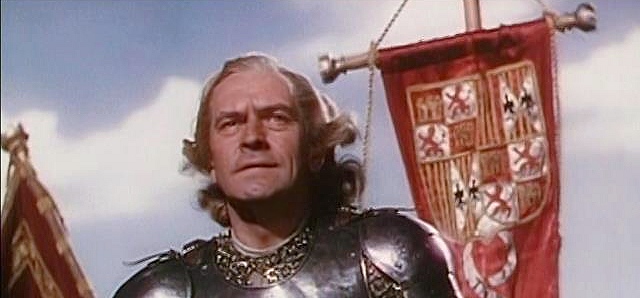


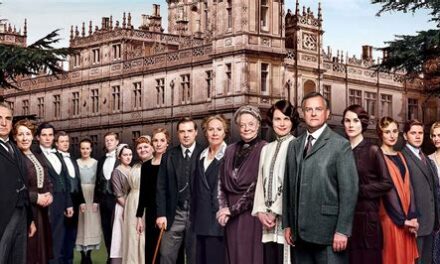










Thank you for the review. Modern films are unwatchable, as so many can attest. The predictable drum beat, it is the same for TV and books. Children’s books are full of the propaganda, women were always strong brutes, feminists, people of color the victims or heroes.
We live in a dumb culture and a dumb world, getting dumber by the day. By the time people hate and wish to destroy their own culture, you’ve pretty much hit rock bottom. Nowhere to go but up. Thank you God, for Christopher Columbus, but what are we going to do about all these Communists?